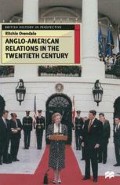Abstract
The period of Attlee’s Labour governments has been seen as the time of the revival of the ‘special relationship’ between Britain and the United States, a relationship revived to face the threat of the Soviet Union at the time of what Walter Lippmann, the American journalist, described in 1947 as the ‘Cold War’. Like Neville Chamberlain’s policy for the ‘appeasement’ of Europe in the late 1930s, myths and legends have proliferated about the origins of the Cold War. ‘Inevitability’ has been invoked; ‘ineluctable forces’ mentioned; ‘accident’ offered as an explanation. The Cold War was a name, given in hindsight, to what appeared as a Soviet threat, first to some British, and then afterwards to American statesmen. The phrase, in inverted commas, began to appear in British official minutes around 1948. By 1949 it was accepted, and written in small letters.
Preview
Unable to display preview. Download preview PDF.
Notes
F. M. Carroll, ‘Anglo-American Relations and the Origins of the Cold War: The New Perspective’, Canadian Journal of History, XXIV (1989), pp. 191–208.
R. Ovendale, ‘Britain, the USA, and the European Cold War, 1945–8’, History, vol. 67 (1982), pp. 217–35
R. Smith and J. Zametica, ‘The Cold Warrior: Clement Attlee Reconsidered, 1945–7’, International Affairs, vol. 61 (1985), pp. 237–52.
Ovendale, The English-Speaking Alliance, pp. 31–3; J. L. Gormley, ‘The Washington Declaration and the “Poor Relation”: Anglo-American Atomic Diplomacy, 1945–46’, Diplomatic History, VIII (1984), pp. 125–43.
Some of the basic ideas could have developed from conversations between Roberts and Kennan. See S. Jackson, ‘Prologue to the Marshall Plan: The Origins of the American Commitment to a European Recovery Program’, Journal of American History, vol. 65 (1979), pp. 1043–68.
See C. Wiebes and B. Zeeman, ‘The Pentagon Negotiations March 1948: The Launching of the North Atlantic Treaty’, International Affairs, vol. 59 (1983), pp. 351–63.
See A. Shlaim, ‘Britain, the Berlin blockade and the Cold War’, International Affairs, vol. 60 (1984), pp. 1–14.
Author information
Authors and Affiliations
Copyright information
© 1998 Ritchie Ovendale
About this chapter
Cite this chapter
Ovendale, R. (1998). The Cold War: Educating the Americans. In: Anglo-American Relations in the Twentieth Century. British History in Perspective. Palgrave, London. https://doi.org/10.1007/978-1-349-26992-1_4
Download citation
DOI: https://doi.org/10.1007/978-1-349-26992-1_4
Publisher Name: Palgrave, London
Print ISBN: 978-0-333-59613-5
Online ISBN: 978-1-349-26992-1
eBook Packages: Palgrave History CollectionHistory (R0)

